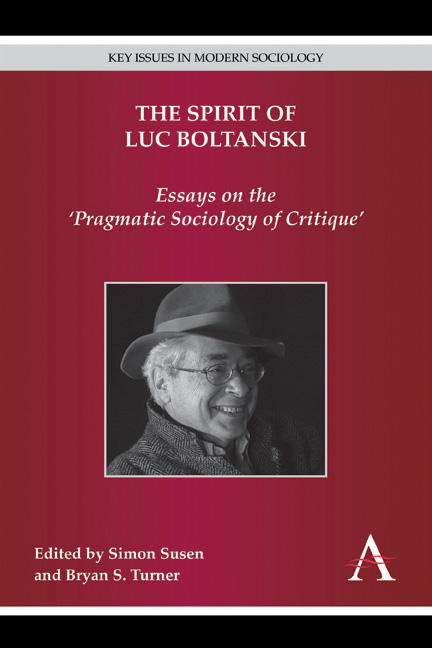Book contents
- Frontmatter
- CONTENTS
- List of Contributors
- Preface
- Part I Introductory Remarks
- Part II Luc Boltanski and (Post-) Classical Sociology
- Part III Luc Boltanski and Pragmatism
- Part IV Luc Boltanski and Critique
- Part V Luc Boltanski and Critical Sociology
- Part VI Luc Boltanski and Political Sociology
- 12 The Promise of Pragmatic Sociology, Human Rights, and the State
- 13 ‘The Political’ in the ‘Pragmatic Sociology of Critique’: Reading Boltanski with Lefort and Castoriadis
- 14 Axel Honneth and Luc Boltanski at the Epicentre of Politics
- 15 The Civil Sphere and On Justification: Two Models of Public Culture
- 16 Luc Boltanski in Euroland
- 17 Reflections on the Indignation of the Disprivileged and the Underprivileged
- Part VII Luc Boltanski and Contemporary Issues
- Part VIII Luc Boltanski in Conversation
- Part IX Luc Boltanski and His Critics
- Index of Names
- Index of Subjects
12 - The Promise of Pragmatic Sociology, Human Rights, and the State
from Part VI - Luc Boltanski and Political Sociology
Published online by Cambridge University Press: 05 December 2014
- Frontmatter
- CONTENTS
- List of Contributors
- Preface
- Part I Introductory Remarks
- Part II Luc Boltanski and (Post-) Classical Sociology
- Part III Luc Boltanski and Pragmatism
- Part IV Luc Boltanski and Critique
- Part V Luc Boltanski and Critical Sociology
- Part VI Luc Boltanski and Political Sociology
- 12 The Promise of Pragmatic Sociology, Human Rights, and the State
- 13 ‘The Political’ in the ‘Pragmatic Sociology of Critique’: Reading Boltanski with Lefort and Castoriadis
- 14 Axel Honneth and Luc Boltanski at the Epicentre of Politics
- 15 The Civil Sphere and On Justification: Two Models of Public Culture
- 16 Luc Boltanski in Euroland
- 17 Reflections on the Indignation of the Disprivileged and the Underprivileged
- Part VII Luc Boltanski and Contemporary Issues
- Part VIII Luc Boltanski in Conversation
- Part IX Luc Boltanski and His Critics
- Index of Names
- Index of Subjects
Summary
Introduction
As a sociologist working in the emerging area of the sociology of human rights, I find the approach that Luc Boltanski and his various collaborators take to cultural, moral, and political questions inspiring. There is an urgent need to develop theoretical concepts and methodologies to study human rights, which have been growing in importance as a result of the activities of transnational advocacy networks, digital communication, and the codification and enactment of international law since the end of the Cold War (see Nash, 2012). What resources do human rights offer for the critique of injustices? Are human rights contributing to imagining solidarity beyond borders? How do we study what difference human rights make to existing social forms – for good or for ill? Pragmatic sociology, with its emphasis on the importance of principles of justice as intrinsic to social life, is an attractive starting point for exploring such questions. Breaking with perspectives in which social life is seen as structured by violence, self-interest, or habit, which all too easily and automatically position human rights as nothing but neo-liberal imperialist ideology, pragmatic sociology opens up the study of disputes, uncertainty, and socially embedded moral argument in ways that can only be promising. Boltanski's groundbreaking book Distant Suffering (1999 [1993]) is itself a landmark contribution to the field, although it focuses on humanitarianism and responses to suffering, rather than on principles of justice and human rights. It was Distant Suffering that first led me to Boltanski's work (Nash, 2008). Reading further, however, it is striking that Boltanski has written nothing explicitly on human rights, despite the concerns of pragmatic sociology with contemporary questions of justice.
In this chapter, I reflect on the value of Boltanski's work on everyday justice and injustices. I also question his neglect of the study of principles of human rights, arguing that it is not just an empirical lack but that, in addition, it has serious consequences for the development of his theoretical framework.
- Type
- Chapter
- Information
- The Spirit of Luc BoltanskiEssays on the 'Pragmatic Sociology of Critique', pp. 351 - 368Publisher: Anthem PressPrint publication year: 2014



